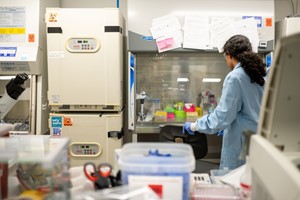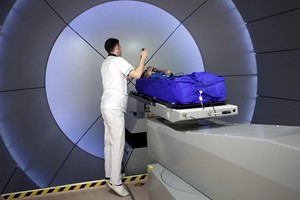The volatility in oil prices and dampened global economic growth due to the outbreak of COVID-19 have given the necessary impetus to the Kingdom of Saudi Arabia’s (KSA’s) ongoing healthcare transformation plan. Health and social development is a key sector for the KSA government as it holds 16.4% of the country’s budget expenditure—the third-largest share in 2020. There has been a relative decrease in the allocation of healthcare budget, which can be attributed to the increase in private player participation and the focus on preventive care through various awareness programs.
For KSA, 2020 will be a reality check on its National Transformation Program (NTP 2020)—the biggest vision realization program of its ambitious Saudi Vision 2030.
The KSA government’s major goal is to enhance the role of the private sector from the current 25% to 35% for economic diversification and cost-containment. To achieve these goals, its key priorities are privatizing government healthcare services, increasing public-private participation (PPP) healthcare delivery models, scaling up medical education and training of its local workforce, and boosting the adoption of digital information systems.
Top 5 Predictions for the 2020 KSA Healthcare Industry:
KSA will be One of the Fastest Growing Digital Health Markets in the GCC Region: Telehealth adoption is approximately 70% in KSA, and almost 34% of the young physicians in KSA use artificial intelligence (AI) to facilitate diagnoses. The KSA government has allocated ~$1.5 billion toward healthcare IT and digital transformation programs. In KSA, the Ministry of Health (MoH) has established an e-Health strategy that will utilize telemedicine to improve the accessibility and quality of care in remote areas where specialty services are not available. COVID-19 boosts the ongoing digital transformation efforts of KSA MoH through the speedy implementation of telemedicine services by healthcare facilities. KSA MoH is trying to strengthen telemedicine services, making it an excellent investment opportunity.
Focus on Wellness and Preventive Care will Catapult Investment toward Non-hospital Settings: By the end of 2020, at least 5% of healthcare service spending will shift to non-hospital care settings. The Saudi government’s $46.3 billion budget allocation during 2019 will provide the stimulus for social determinant of health (SDOH) projects. The Saudi government has rolled out initiatives (e.g., Quality of Life Program 2020) focusing on fitness and preventive care. KSA is aiming for a 3% reduction in obesity and a 10% decrease in diabetes prevalence by 2030.
Demand for Specialty Clinics and Ambulatory Care Center will Drive Privatization: Due to government policies that favor PPP deals, the number of private hospitals in KSA will exceed 120 by the end of 2020. There will be more than 100 ambulatory centers and mobile clinics in KSA by the end of 2020. Despite the presence of several general hospitals, there are supply gaps for several specialty areas, spurring governments to harness PPP models to build specialty clinics for gynecology, oncology, and cosmetology.
KSA will Become the Branded Generics Manufacturing Hub of the MENA Region: The low level of domestic pharmaceutical drug production (20% to 30%) in the Gulf Cooperation Council (GCC), coupled with the ambition to diversify into non-oil sectors (e.g., bio-economy) will continue to make the localization of pharma drug manufacturing a lucrative opportunity in 2020.
KSA Healthcare Expenditure on Diabetes and Other Lifestyle Disorders will Increase: During 2020, KSA will spend 25% to 35% of the total healthcare budget on diabetes, obesity, and cardiovascular diseases. With the push for preventive care screening for managing chronic diseases, the number of PHC visits per capita will double in 2020. Non-communicable diseases accounted for 68% of all deaths in KSA; 17.9% of the Saudi adult population has diabetes, and more than 40% of Saudi citizens are obese, which is a major risk factor for chronic diseases such as diabetes, cardiovascular disorders, cancer, and kidney disease.
The private sector has a larger role to play in filling the demand-supply gap in healthcare infrastructure and services. The increasing number of private hospitals will bridge the gap of quality and accessibility of healthcare services in public hospitals, which is a major concern in healthcare delivery. The increase in investments in enterprise healthcare IT solutions and connected medical devices with AI capabilities that drive efficiencies will play a major role in the shift to a performance-based value system. Thus, there are a plethora of opportunities for investors, pharmaceuticals, in-vitro diagnostics (IVD) and MedTech manufacturers, healthcare IT vendors, and support services.













